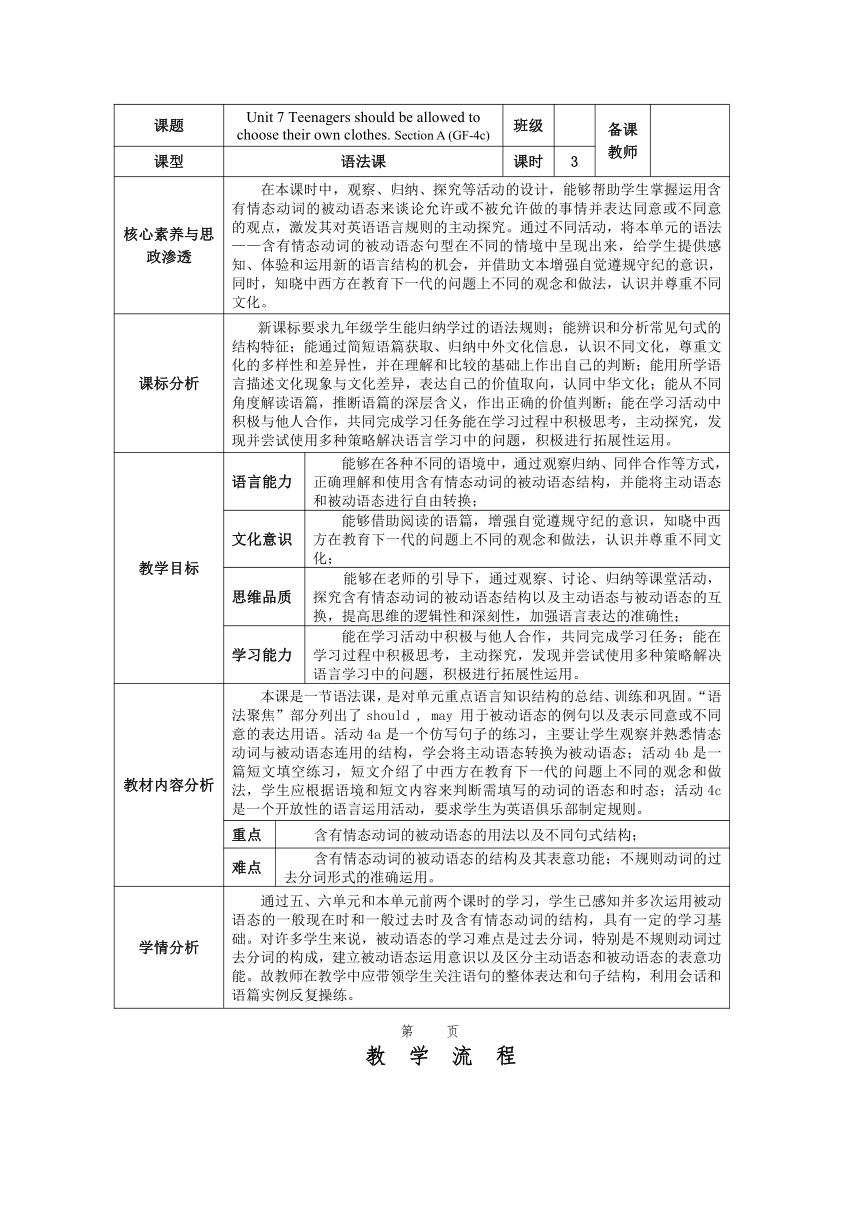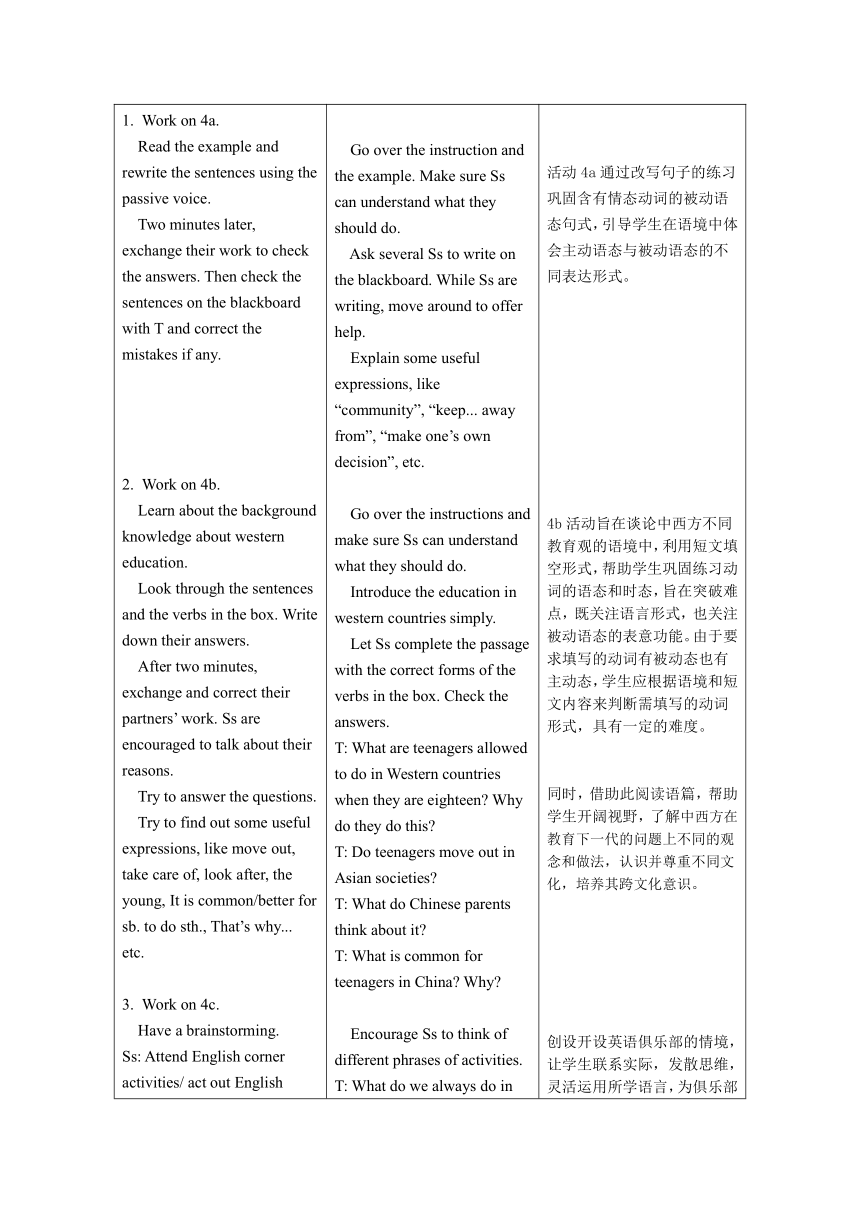【核心素养目标】Unit 7 Teenagers should be allowed to choose their own clothes. Section A (GF-4c) 表格式教案
文档属性
| 名称 | 【核心素养目标】Unit 7 Teenagers should be allowed to choose their own clothes. Section A (GF-4c) 表格式教案 |  | |
| 格式 | docx | ||
| 文件大小 | 524.3KB | ||
| 资源类型 | 教案 | ||
| 版本资源 | 人教新目标(Go for it)版 | ||
| 科目 | 英语 | ||
| 更新时间 | 2024-09-24 10:53:10 | ||
图片预览



文档简介
课题 Unit 7 Teenagers should be allowed to choose their own clothes. Section A (GF-4c) 班级 备课教师
课型 语法课 课时 3
核心素养与思政渗透 在本课时中,观察、归纳、探究等活动的设计,能够帮助学生掌握运用含有情态动词的被动语态来谈论允许或不被允许做的事情并表达同意或不同意的观点,激发其对英语语言规则的主动探究。通过不同活动,将本单元的语法——含有情态动词的被动语态句型在不同的情境中呈现出来,给学生提供感知、体验和运用新的语言结构的机会,并借助文本增强自觉遵规守纪的意识,同时,知晓中西方在教育下一代的问题上不同的观念和做法,认识并尊重不同文化。
课标分析 新课标要求九年级学生能归纳学过的语法规则;能辨识和分析常见句式的结构特征;能通过简短语篇获取、归纳中外文化信息,认识不同文化,尊重文化的多样性和差异性,并在理解和比较的基础上作出自己的判断;能用所学语言描述文化现象与文化差异,表达自己的价值取向,认同中华文化;能从不同角度解读语篇,推断语篇的深层含义,作出正确的价值判断;能在学习活动中积极与他人合作,共同完成学习任务能在学习过程中积极思考,主动探究,发现并尝试使用多种策略解决语言学习中的问题,积极进行拓展性运用。
教学目标 语言能力 能够在各种不同的语境中,通过观察归纳、同伴合作等方式,正确理解和使用含有情态动词的被动语态结构,并能将主动语态和被动语态进行自由转换;
文化意识 能够借助阅读的语篇,增强自觉遵规守纪的意识,知晓中西方在教育下一代的问题上不同的观念和做法,认识并尊重不同文化;
思维品质 能够在老师的引导下,通过观察、讨论、归纳等课堂活动,探究含有情态动词的被动语态结构以及主动语态与被动语态的互换,提高思维的逻辑性和深刻性,加强语言表达的准确性;
学习能力 能在学习活动中积极与他人合作,共同完成学习任务;能在学习过程中积极思考,主动探究,发现并尝试使用多种策略解决语言学习中的问题,积极进行拓展性运用。
教材内容分析 本课是一节语法课,是对单元重点语言知识结构的总结、训练和巩固。“语法聚焦”部分列出了should , may 用于被动语态的例句以及表示同意或不同意的表达用语。活动4a是一个仿写句子的练习,主要让学生观察并熟悉情态动词与被动语态连用的结构,学会将主动语态转换为被动语态;活动4b是一篇短文填空练习,短文介绍了中西方在教育下一代的问题上不同的观念和做法,学生应根据语境和短文内容来判断需填写的动词的语态和时态;活动4c是一个开放性的语言运用活动,要求学生为英语俱乐部制定规则。
重点 含有情态动词的被动语态的用法以及不同句式结构;
难点 含有情态动词的被动语态的结构及其表意功能;不规则动词的过去分词形式的准确运用。
学情分析 通过五、六单元和本单元前两个课时的学习,学生已感知并多次运用被动语态的一般现在时和一般过去时及含有情态动词的结构,具有一定的学习基础。对许多学生来说,被动语态的学习难点是过去分词,特别是不规则动词过去分词的构成,建立被动语态运用意识以及区分主动语态和被动语态的表意功能。故教师在教学中应带领学生关注语句的整体表达和句子结构,利用会话和语篇实例反复操练。
第 页
教 学 流 程
设 计 教 学 过 程 设 计 意 图
学 生 活 动 教 师 导 学
Step 1. Review. Observe the pictures and try to say some rules with the passive voice with modal verbs. Sa: We should be allowed to ask questions in school. Sb: We should not be allowed to bring mobile phones to school. Chant the rules with T. Ss: No, we shouldn’t. Step 2. Presentation. With the tips of T, review the rules in the museum. Try to sum up the verbs. Read the examples and work in pairs to sum up the sentence structures. Do some exercises. Step 3. Practice. Work on 4a. Read the example and rewrite the sentences using the passive voice. Two minutes later, exchange their work to check the answers. Then check the sentences on the blackboard with T and correct the mistakes if any. Work on 4b. Learn about the background knowledge about western education. Look through the sentences and the verbs in the box. Write down their answers. After two minutes, exchange and correct their partners’ work. Ss are encouraged to talk about their reasons. Try to answer the questions. Try to find out some useful expressions, like move out, take care of, look after, the young, It is common/better for sb. to do sth., That’s why... etc. Work on 4c. Have a brainstorming. Ss: Attend English corner activities/ act out English plays/ sing English songs/ ... Work in groups of six and discuss on the rules of different activities in the English club. One student take notes in each group. Then give a report in class. Step 4. Conclusion. Show some pictures to guide Ss review the the rules. T: Should we be allowed to fight at school T: No rules, no standards. Guide Ss to read the conversation in 2d and find out the sentences in passive voice. Let Ss observe the sentences they’ve found and have a conclusion about the structures of verbs. Provide more examples for Ss to conclude the sentence structures. E.g. We should be allowed to ask questions in school. We should not be allowed to speak aloud. Should we be allowed to take photos Go over the instruction and the example. Make sure Ss can understand what they should do. Ask several Ss to write on the blackboard. While Ss are writing, move around to offer help. Explain some useful expressions, like “community”, “keep... away from”, “make one’s own decision”, etc. Go over the instructions and make sure Ss can understand what they should do. Introduce the education in western countries simply. Let Ss complete the passage with the correct forms of the verbs in the box. Check the answers. T: What are teenagers allowed to do in Western countries when they are eighteen Why do they do this T: Do teenagers move out in Asian societies T: What do Chinese parents think about it T: What is common for teenagers in China Why Encourage Ss to think of different phrases of activities. T: What do we always do in an English club Divide Ss into different groups and assign different activities to groups. Let them have a discussion about the rules. Invite some group leaders to report their rules. 通过图片引导学生知晓一些不同场所的规则,导入本课语法内容,激发学习兴趣,激活已有知识储备。 利用问题引导学生关注并观察本课要探讨的语法现象——含有情态动词的被动语态,基于2d对话中所列出句子以及补充的语料,逐步引导学生观察、感知、体验、归纳,让学生小组讨论并分享关于含有情态动词的被动语态的语用功能、句式变化等。再通过练习巩固强化,引导学生进行尝试与运用。 活动4a通过改写句子的练习巩固含有情态动词的被动语态句式,引导学生在语境中体会主动语态与被动语态的不同表达形式。 4b活动旨在谈论中西方不同教育观的语境中,利用短文填空形式,帮助学生巩固练习动词的语态和时态,旨在突破难点,既关注语言形式,也关注被动语态的表意功能。由于要求填写的动词有被动态也有主动态,学生应根据语境和短文内容来判断需填写的动词形式,具有一定的难度。 同时,借助此阅读语篇,帮助学生开阔视野,了解中西方在教育下一代的问题上不同的观念和做法,认识并尊重不同文化,培养其跨文化意识。 创设开设英语俱乐部的情境,让学生联系实际,发散思维,灵活运用所学语言,为俱乐部制定规则,在乐趣和合作中再一次巩固目标语言。
第 页
课 时 达 标 检 测
Ⅰ. 选择题 ( )1. People talk on a mobile phone while they are driving. A.shouldn't B.needn't C.can ( ) 2.The dictionary may for three weeks. A.keep B.be kept C.borrow ( )3.A lot of stars in the sky at night in summer. A.can be seen B.can see C.is seen ( )4.—What's the meaning of the activity “Let's Save” —Paper shouldn't in everyday life. A.waste B.wasted C.be wasted Ⅱ. 根据汉语意思完成句子。 5.这个项目到本周末必须完成。 This project by the end of this week. 6.应该允许他们加入俱乐部。 They should the club. 7.因为这起事故,我们可能受到惩罚。 We because of this accident. 8.他们需要在那里建一座大桥,而且要建得很好。 They need a big bridge over there and it must well. Ⅲ.按要求完成下列各题。 9.My computer can be used by him.(改为主动语态) my computer. 10.The plan should be discussed again.(改为否定句) The plan discussed again. 11.English must be spoken at the meeting.(改为一般疑问句,并作否定回答) — English at the meeting —No, it .
第 页
课 时 教 学 设 计 尾 页
板 书 设 计
Unit 7 Teenagers should be allowed to choose their own clothes. Section A (GF-4c)
作 业 设 计
Level A Work in groups and make a poster titled “English Club Rules”. Try to use passive voice.
Level B Do more exercises of the passive voice.
教 学 反 思
第 页
课型 语法课 课时 3
核心素养与思政渗透 在本课时中,观察、归纳、探究等活动的设计,能够帮助学生掌握运用含有情态动词的被动语态来谈论允许或不被允许做的事情并表达同意或不同意的观点,激发其对英语语言规则的主动探究。通过不同活动,将本单元的语法——含有情态动词的被动语态句型在不同的情境中呈现出来,给学生提供感知、体验和运用新的语言结构的机会,并借助文本增强自觉遵规守纪的意识,同时,知晓中西方在教育下一代的问题上不同的观念和做法,认识并尊重不同文化。
课标分析 新课标要求九年级学生能归纳学过的语法规则;能辨识和分析常见句式的结构特征;能通过简短语篇获取、归纳中外文化信息,认识不同文化,尊重文化的多样性和差异性,并在理解和比较的基础上作出自己的判断;能用所学语言描述文化现象与文化差异,表达自己的价值取向,认同中华文化;能从不同角度解读语篇,推断语篇的深层含义,作出正确的价值判断;能在学习活动中积极与他人合作,共同完成学习任务能在学习过程中积极思考,主动探究,发现并尝试使用多种策略解决语言学习中的问题,积极进行拓展性运用。
教学目标 语言能力 能够在各种不同的语境中,通过观察归纳、同伴合作等方式,正确理解和使用含有情态动词的被动语态结构,并能将主动语态和被动语态进行自由转换;
文化意识 能够借助阅读的语篇,增强自觉遵规守纪的意识,知晓中西方在教育下一代的问题上不同的观念和做法,认识并尊重不同文化;
思维品质 能够在老师的引导下,通过观察、讨论、归纳等课堂活动,探究含有情态动词的被动语态结构以及主动语态与被动语态的互换,提高思维的逻辑性和深刻性,加强语言表达的准确性;
学习能力 能在学习活动中积极与他人合作,共同完成学习任务;能在学习过程中积极思考,主动探究,发现并尝试使用多种策略解决语言学习中的问题,积极进行拓展性运用。
教材内容分析 本课是一节语法课,是对单元重点语言知识结构的总结、训练和巩固。“语法聚焦”部分列出了should , may 用于被动语态的例句以及表示同意或不同意的表达用语。活动4a是一个仿写句子的练习,主要让学生观察并熟悉情态动词与被动语态连用的结构,学会将主动语态转换为被动语态;活动4b是一篇短文填空练习,短文介绍了中西方在教育下一代的问题上不同的观念和做法,学生应根据语境和短文内容来判断需填写的动词的语态和时态;活动4c是一个开放性的语言运用活动,要求学生为英语俱乐部制定规则。
重点 含有情态动词的被动语态的用法以及不同句式结构;
难点 含有情态动词的被动语态的结构及其表意功能;不规则动词的过去分词形式的准确运用。
学情分析 通过五、六单元和本单元前两个课时的学习,学生已感知并多次运用被动语态的一般现在时和一般过去时及含有情态动词的结构,具有一定的学习基础。对许多学生来说,被动语态的学习难点是过去分词,特别是不规则动词过去分词的构成,建立被动语态运用意识以及区分主动语态和被动语态的表意功能。故教师在教学中应带领学生关注语句的整体表达和句子结构,利用会话和语篇实例反复操练。
第 页
教 学 流 程
设 计 教 学 过 程 设 计 意 图
学 生 活 动 教 师 导 学
Step 1. Review. Observe the pictures and try to say some rules with the passive voice with modal verbs. Sa: We should be allowed to ask questions in school. Sb: We should not be allowed to bring mobile phones to school. Chant the rules with T. Ss: No, we shouldn’t. Step 2. Presentation. With the tips of T, review the rules in the museum. Try to sum up the verbs. Read the examples and work in pairs to sum up the sentence structures. Do some exercises. Step 3. Practice. Work on 4a. Read the example and rewrite the sentences using the passive voice. Two minutes later, exchange their work to check the answers. Then check the sentences on the blackboard with T and correct the mistakes if any. Work on 4b. Learn about the background knowledge about western education. Look through the sentences and the verbs in the box. Write down their answers. After two minutes, exchange and correct their partners’ work. Ss are encouraged to talk about their reasons. Try to answer the questions. Try to find out some useful expressions, like move out, take care of, look after, the young, It is common/better for sb. to do sth., That’s why... etc. Work on 4c. Have a brainstorming. Ss: Attend English corner activities/ act out English plays/ sing English songs/ ... Work in groups of six and discuss on the rules of different activities in the English club. One student take notes in each group. Then give a report in class. Step 4. Conclusion. Show some pictures to guide Ss review the the rules. T: Should we be allowed to fight at school T: No rules, no standards. Guide Ss to read the conversation in 2d and find out the sentences in passive voice. Let Ss observe the sentences they’ve found and have a conclusion about the structures of verbs. Provide more examples for Ss to conclude the sentence structures. E.g. We should be allowed to ask questions in school. We should not be allowed to speak aloud. Should we be allowed to take photos Go over the instruction and the example. Make sure Ss can understand what they should do. Ask several Ss to write on the blackboard. While Ss are writing, move around to offer help. Explain some useful expressions, like “community”, “keep... away from”, “make one’s own decision”, etc. Go over the instructions and make sure Ss can understand what they should do. Introduce the education in western countries simply. Let Ss complete the passage with the correct forms of the verbs in the box. Check the answers. T: What are teenagers allowed to do in Western countries when they are eighteen Why do they do this T: Do teenagers move out in Asian societies T: What do Chinese parents think about it T: What is common for teenagers in China Why Encourage Ss to think of different phrases of activities. T: What do we always do in an English club Divide Ss into different groups and assign different activities to groups. Let them have a discussion about the rules. Invite some group leaders to report their rules. 通过图片引导学生知晓一些不同场所的规则,导入本课语法内容,激发学习兴趣,激活已有知识储备。 利用问题引导学生关注并观察本课要探讨的语法现象——含有情态动词的被动语态,基于2d对话中所列出句子以及补充的语料,逐步引导学生观察、感知、体验、归纳,让学生小组讨论并分享关于含有情态动词的被动语态的语用功能、句式变化等。再通过练习巩固强化,引导学生进行尝试与运用。 活动4a通过改写句子的练习巩固含有情态动词的被动语态句式,引导学生在语境中体会主动语态与被动语态的不同表达形式。 4b活动旨在谈论中西方不同教育观的语境中,利用短文填空形式,帮助学生巩固练习动词的语态和时态,旨在突破难点,既关注语言形式,也关注被动语态的表意功能。由于要求填写的动词有被动态也有主动态,学生应根据语境和短文内容来判断需填写的动词形式,具有一定的难度。 同时,借助此阅读语篇,帮助学生开阔视野,了解中西方在教育下一代的问题上不同的观念和做法,认识并尊重不同文化,培养其跨文化意识。 创设开设英语俱乐部的情境,让学生联系实际,发散思维,灵活运用所学语言,为俱乐部制定规则,在乐趣和合作中再一次巩固目标语言。
第 页
课 时 达 标 检 测
Ⅰ. 选择题 ( )1. People talk on a mobile phone while they are driving. A.shouldn't B.needn't C.can ( ) 2.The dictionary may for three weeks. A.keep B.be kept C.borrow ( )3.A lot of stars in the sky at night in summer. A.can be seen B.can see C.is seen ( )4.—What's the meaning of the activity “Let's Save” —Paper shouldn't in everyday life. A.waste B.wasted C.be wasted Ⅱ. 根据汉语意思完成句子。 5.这个项目到本周末必须完成。 This project by the end of this week. 6.应该允许他们加入俱乐部。 They should the club. 7.因为这起事故,我们可能受到惩罚。 We because of this accident. 8.他们需要在那里建一座大桥,而且要建得很好。 They need a big bridge over there and it must well. Ⅲ.按要求完成下列各题。 9.My computer can be used by him.(改为主动语态) my computer. 10.The plan should be discussed again.(改为否定句) The plan discussed again. 11.English must be spoken at the meeting.(改为一般疑问句,并作否定回答) — English at the meeting —No, it .
第 页
课 时 教 学 设 计 尾 页
板 书 设 计
Unit 7 Teenagers should be allowed to choose their own clothes. Section A (GF-4c)
作 业 设 计
Level A Work in groups and make a poster titled “English Club Rules”. Try to use passive voice.
Level B Do more exercises of the passive voice.
教 学 反 思
第 页
同课章节目录
- Unit 1 How can we become good learners.
- Section A
- Section B
- Unit 2 I think that mooncakes are delicious!
- Section A
- Section B
- Unit 3 Could you please tell me where the restroom
- Section A
- Section B
- Unit 4 I used to be afraid of the dark.
- Section A
- Section B
- Unit 5 What are the shirts made of?
- Section A
- Section B
- Review of Units 1-5
- Unit 6 When was it invented?
- Section A
- Section B
- Unit 7 Teenagers should be allowed to choose their
- Section A
- Section B
- Unit 8 It must belong to Carla.
- Section A
- Section B
- Unit 9 I like music that I can dance to.
- Section A
- Section B
- Unit 10 You're supposed to shake hands.
- Section A
- Section B
- Review of Units 6-10
- Unit 11 Sad movies make me cry.
- Section A
- Section B
- Unit 12 Life is full of the unexpected
- Section A
- Section B
- Unit 13 We're trying to save the earth!
- Section A
- Section B
- Unit 14 I remember meeting all of you in Grade 7.
- Section A
- Section B
- Review of Units 11-14
